Ancient Irish Games Hurling And Curling Were Forbidden In 1366 By The Englishmen
AncientPages.com - During the Anglo-Norman invasion of Ireland that took place in stages throughout the late 12th century, the Englishmen did their best to prevent their colonizers to become too Irish.
There was a distinct difference between who was considered "mere" Irish and the Anglo-Irish colonizers. One way of avoiding confusion between these two groups was to prohibit participation in certain ancient traditions and sports.
Hurling and curling were two ancient Irish games that were very popular and were forbidden in 1366, as stated in the Statutes of Kilkenny.
The English had difficulty in taking over Ireland. The first English settlers, the Anglo-Irish, began to become Irish in the way the viewed the world. They began to put their own interests ahead of those of the English royalty.
These problems led to the creation of the Statutes of Kilkenny that were a set of laws made by the English in 1367 to try and save the English colony in Ireland. The laws were made by the Lord Lieutenant of Ireland, Lionel of Antwerp, 1st Duke of Clarence. They were passed at a meeting of the Irish parliament held at Kilkenny.
See also:
Tailteann Games: Ancient Irish Version Of The Olympic Games
Hnefatafl: Ancient Viking Board Game “King’s Table” Popular In Medieval Scandinavia
Ancient Chinese Ball Game Cuju Is Earliest Form Of Football
Hurling was an ancient outdoor game of Gaelic and Irish origin. It was a game similar to lacrosse invented by Native Ameican Indians. It is thought to predate Christianity, having come to Ireland with the Celts. The game has been played for over 3,000 years and is still popular today. It is played with sticks and a ball and it shares a number of features with Gaelic football, such as the field and goals, the number of players, and much terminology.
In the book by Seamus King "A History of Hurling" there is a reference from Irish verbal history of hurling as far back as the 1200 B.C being played in Tara, County Meath.
What ancient curling was is not entirely clear, but it is possible it was a game of Scottish origin where players slide smoothed stones down an icy rink toward a target. Several online histories of curling suggest coiting or curling was the word used for a similar slide rock on ice game in the medieval Low Countries.
Both games were considered much too violent and were banned. According to the Statutes of Kilkenny hurling and curling were so violent that playing these games could lead to severe permanent injury. That was unwanted as it could result in weaker defense of the country.
An article 6 of the Statues of Kilkenny sates: "Also, whereas a land, which is at war, requires that every person do render himself able to defend himself, it is ordained, and established, that the commons of the said land of Ireland, who are in the different marches at war, do not, henceforth, use the plays which men call horlings, with great sticks and a ball upon the ground, from which great evils and maims have arisen, to the weakening, of the defence of the said land, and other plays which men call coiting; but that they do apply and accustom themselves to use and draw bows, and throw lances, and other gentlemanlike games, whereby the Irish enemies may be the better checked by the liege people and commons of these parts; and if any do or practice the contrary, and of this be attainted, they shall be taken and imprisoned, and fined at the will of our lord the king."
Instead of playing hurling and curling, the Anglo-Irish colonizers were encouraged to practice sports such as archery and javelin throw so that men could strengthen their bodies and become better fighters against the Irishmen.
Copyright © AncientPages.com All rights reserved. This material may not be published, broadcast, rewritten or redistributed in whole or part without the express written permission of AncientPages.com
More From Ancient Pages
-
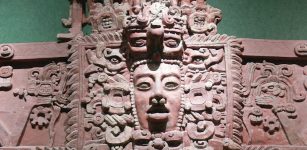 Ancient Maya Lessons On Surviving Drought – Examined By Scientists
Archaeology | Jan 5, 2022
Ancient Maya Lessons On Surviving Drought – Examined By Scientists
Archaeology | Jan 5, 2022 -
 Neolithic Cow Tooth And Evidence Linking Cattle Remains From Stonehenge To Wales
Archaeology | Aug 29, 2025
Neolithic Cow Tooth And Evidence Linking Cattle Remains From Stonehenge To Wales
Archaeology | Aug 29, 2025 -
 Seafaring Hunter-Gatherers Reached Malta And Other Remote Islands Thousands Of Years Before The First Farmers
Archaeology | Apr 10, 2025
Seafaring Hunter-Gatherers Reached Malta And Other Remote Islands Thousands Of Years Before The First Farmers
Archaeology | Apr 10, 2025 -
 Kentucky’s Little-Known Ancient Underground City And Mysterious Lost Civilization
Featured Stories | Jun 13, 2024
Kentucky’s Little-Known Ancient Underground City And Mysterious Lost Civilization
Featured Stories | Jun 13, 2024 -
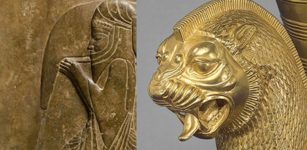 Peace Of Callias – A Treaty That Ended The Greco-Persian Wars
Ancient History Facts | May 15, 2019
Peace Of Callias – A Treaty That Ended The Greco-Persian Wars
Ancient History Facts | May 15, 2019 -
 Iktomi – Native American Spider-Trickster Spirit Whose Stories Teach Moral Values
Featured Stories | Jan 28, 2019
Iktomi – Native American Spider-Trickster Spirit Whose Stories Teach Moral Values
Featured Stories | Jan 28, 2019 -
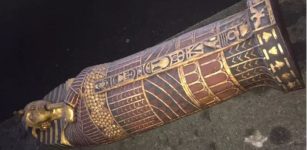 How Did An Ancient Egyptian Sarcophagus End Up Abandoned On A Street In London?
Artifacts | Mar 22, 2023
How Did An Ancient Egyptian Sarcophagus End Up Abandoned On A Street In London?
Artifacts | Mar 22, 2023 -
 Bad Dürrenberg Shaman’s 9,000-Year-Old Spectacular Headdress And Another Surprising Discovery
Archaeology | Dec 12, 2025
Bad Dürrenberg Shaman’s 9,000-Year-Old Spectacular Headdress And Another Surprising Discovery
Archaeology | Dec 12, 2025 -
 The 5,500-Year-Old Underground Rock Settlement With Illuminated Galleries In Ancient City Of Hadrianopolis, Turkey
Archaeology | Sep 18, 2023
The 5,500-Year-Old Underground Rock Settlement With Illuminated Galleries In Ancient City Of Hadrianopolis, Turkey
Archaeology | Sep 18, 2023 -
 Dearg-Due Frightening Female Demon And Tyrannical Abhartach Of Irish Folklore
Celtic Mythology | Jan 5, 2017
Dearg-Due Frightening Female Demon And Tyrannical Abhartach Of Irish Folklore
Celtic Mythology | Jan 5, 2017 -
 War God Ares Was Brutal, Merciless And Disliked By Greeks But Popular In His Love Affairs
Featured Stories | Apr 16, 2021
War God Ares Was Brutal, Merciless And Disliked By Greeks But Popular In His Love Affairs
Featured Stories | Apr 16, 2021 -
 Pre-Clovis, Paisley Caves: Archaeologists Identified The Earliest Population Of North America
Archaeology | Jul 16, 2020
Pre-Clovis, Paisley Caves: Archaeologists Identified The Earliest Population Of North America
Archaeology | Jul 16, 2020 -
 Andlang – Spiritual Heaven And Shelter For The Dead After Ragnarok In Norse Mythology
Featured Stories | Aug 23, 2019
Andlang – Spiritual Heaven And Shelter For The Dead After Ragnarok In Norse Mythology
Featured Stories | Aug 23, 2019 -
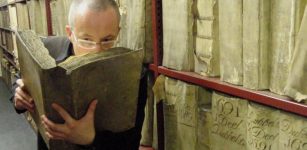 Odeuropa – Unusual Project Will Recreate The Smells Of Old Europe And Store The Scents In A Library
News | Nov 17, 2020
Odeuropa – Unusual Project Will Recreate The Smells Of Old Europe And Store The Scents In A Library
News | Nov 17, 2020 -
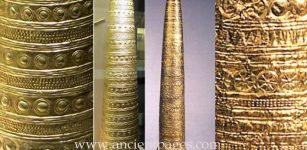 Mystery Of 3,000-Year-Old Conical Hats – Was It A Highly Advanced Device?
Artifacts | Jun 20, 2020
Mystery Of 3,000-Year-Old Conical Hats – Was It A Highly Advanced Device?
Artifacts | Jun 20, 2020 -
 Riddle How Human’s Uniquely DNA Evolved Solved By Scientists
DNA | Jan 13, 2023
Riddle How Human’s Uniquely DNA Evolved Solved By Scientists
DNA | Jan 13, 2023 -
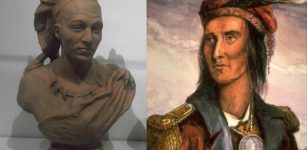 Tecumseh: Native American Mystic, Warrior, Hero And Military Leader Of The Shawnee
Featured Stories | Jun 3, 2016
Tecumseh: Native American Mystic, Warrior, Hero And Military Leader Of The Shawnee
Featured Stories | Jun 3, 2016 -
 Evidence Of Carthaginian Presence In Northern Europe?
Featured Stories | Jun 18, 2022
Evidence Of Carthaginian Presence In Northern Europe?
Featured Stories | Jun 18, 2022 -
 Strange Radiation Case – Medical Files Secretly Erased?
Featured Stories | Sep 13, 2019
Strange Radiation Case – Medical Files Secretly Erased?
Featured Stories | Sep 13, 2019 -
 Female Viking Pirate Rusla – The Red Maiden’s Deadly Encounter With Her Brother Tesondus
Vikings | Jul 29, 2025
Female Viking Pirate Rusla – The Red Maiden’s Deadly Encounter With Her Brother Tesondus
Vikings | Jul 29, 2025


